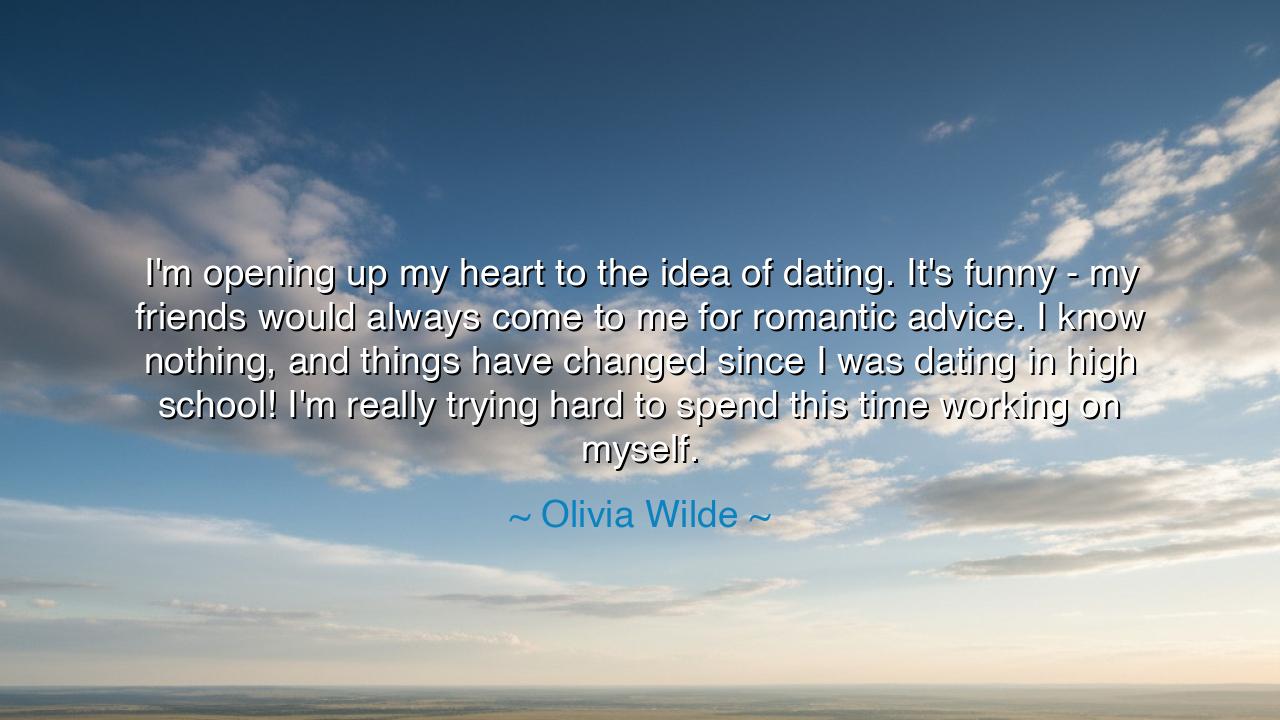
I'm opening up my heart to the idea of dating. It's funny - my
I'm opening up my heart to the idea of dating. It's funny - my friends would always come to me for romantic advice. I know nothing, and things have changed since I was dating in high school! I'm really trying hard to spend this time working on myself.






“I’m opening up my heart to the idea of dating. It’s funny — my friends would always come to me for romantic advice. I know nothing, and things have changed since I was dating in high school! I’m really trying hard to spend this time working on myself.” Thus spoke Olivia Wilde, a woman both artist and philosopher, who in these words reveals not merely her personal journey, but the timeless human quest for renewal. Her statement may seem simple — a reflection on love and self-discovery — yet within it lies a truth that the ancients themselves would have honored: that to open the heart after pain, to admit uncertainty, and to seek wisdom within oneself is among the most courageous acts of life.
In saying she is “opening up my heart,” Wilde invokes one of the oldest metaphors known to humankind. The heart, in every age and culture, has been seen as the temple of the soul — the place where courage, love, and truth reside. To open it, then, is no small thing. It is to risk vulnerability after disappointment, to allow new possibilities to enter, even when the memory of loss still lingers. In these words we hear humility — for she confesses that she “knows nothing,” and in that admission, she becomes a student again. The ancients called this the path of renewal: the journey that begins not in knowing, but in unknowing, in the acceptance that wisdom must be relearned through experience.
When Wilde observes that “things have changed since I was dating in high school,” she speaks to the shifting nature of the world — and of the self. Love, like life, does not remain fixed; it evolves with time, shaped by the tides of experience. The person who loved in youth is not the same as the one who loves in maturity. The ancients would have said that time refines the soul as fire refines metal. What once was simple becomes profound; what once was impulsive becomes intentional. Wilde’s words capture this evolution — the recognition that to reenter the world of love after transformation requires not naivety, but self-awareness. It is not enough to seek another; one must first understand oneself anew.
Her reflection that friends once sought her romantic advice adds a layer of irony and wisdom. It reveals how easily we can speak of love when it concerns others, yet how difficult it becomes when it concerns ourselves. Many through history have known this paradox — the philosopher who counsels kings yet struggles to govern his own desires, the poet who writes of passion but fears vulnerability. Socrates, the great teacher of Athens, once said, “I know that I know nothing.” Wilde’s echo of that truth is unintentional yet profound. In admitting her uncertainty, she demonstrates the first step of true wisdom — humility before the mysteries of the heart.
Her final confession — “I’m really trying hard to spend this time working on myself” — is perhaps the most powerful of all. For here she recognizes that the journey of love begins not with the finding of another, but with the healing and cultivation of the self. The ancients understood this well. Before a warrior could march into battle, he was trained to master his own fear. Before a philosopher could guide the city, he was required to know his own soul. Likewise, before one can love rightly, one must first be whole. Wilde’s words remind us that self-work is sacred work, and that solitude, far from being emptiness, can be the forge in which the heart is made strong again.
Consider the story of Odysseus, who after years of wandering and trial, longed to return to his home and his beloved Penelope. Yet before he could, he had to endure countless tests — not to prove his power, but to purify his spirit. So too must every human soul endure its own odyssey — the long voyage back to the self. Wilde’s journey of self-reflection is a modern echo of this ancient tale. To “open the heart” is not simply to seek love again, but to return home to one’s own essence — wiser, braver, and more patient than before.
And so, my listener, the lesson is this: do not fear the silence between loves, nor the seasons of solitude. For in those quiet hours, you are not waiting — you are becoming. Take this time, as Wilde does, to know yourself, to tend to the inner garden that will one day welcome another soul. Do not rush toward affection out of loneliness, but out of fullness. Let love find you not unfinished, but whole.
For the heart that is healed, humble, and open — that heart does not chase love; it attracts it. The one who says, as Olivia Wilde does, “I am opening my heart, and I am working on myself,” is already on the path to a deeper, truer connection — not just with another, but with life itself. In this, there is no weakness, only strength; no hesitation, only wisdom. For to open one’s heart is not to risk loss, but to proclaim faith in the beauty of beginning again.






AAdministratorAdministrator
Welcome, honored guests. Please leave a comment, we will respond soon